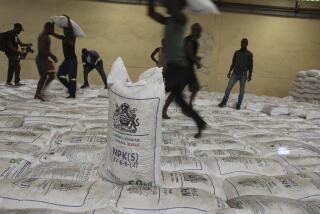Soviets Increasing Aid to Third World Allies--but With Strings
PARIS — The Soviet Union sharply increased its aid to Third World allies in 1987 but is making new demands for efficiency, according to an internal document of the Organization for Economic Cooperation and Development.
In a confidential report obtained this month by the Associated Press, the organization ranked the Soviet Union as the world’s fourth-largest donor of development aid, after the United States, Britain and France.
The Soviet Union’s share of such aid increased from 5% to 9%, said the organization, which groups 24 non-Communist industrialized countries.
It said Soviet aid is concentrated more than ever, however, on ideological and political partners.
Three-quarters of Moscow’s $4.2 billion in aid still goes to Cuba, Mongolia and Vietnam. The rest is mainly for Afghanistan, Ethiopia, Cambodia, North Korea, Laos, Mozambique, Nicaragua and South Yemen.
The report, entitled “New Trends in U.S.S.R. Aid,” said that few resources were left for other countries and that aid to numerous traditional recipients, including Algeria, Iran and Turkey, has declined substantially.
“The only major exception is India, which continues to enjoy privileged relations,” it said.
Because of rising aid costs and diminishing economic and political returns, the Kremlin has insisted that its allies accelerate reforms, the report said.
Soviet authorities encouraged Angola and Mozambique to seek more Western aid. They cut subsidized fuel deliveries to Ethiopia and Nicaragua to reapportion strained resources, it said.
At a special meeting in June, Soviet officials promised continued aid to traditional recipients but “insisted strongly” that they join in enterprises to increase production and scientific advances, the report said.
As early as 1985, it said, Soviet experts recommended that Ethiopia scale back its inefficient large state farms and encourage private farming. It said the experts acknowledged that Soviet-style state farms were not always efficient in poor, developing nations and called for a freer movement of the market.
Recipients, meanwhile, complained that Soviet administrators were deducting excessive service charges, it said.
The report noted these developments:
-- In negotiating its contribution to Cuba’s 1986-90 five-year plan, the Soviet Union insisted on giving priority to finishing outstanding projects rather than beginning new ones.
But authorities promised a 50% increase in new credits, reaching a level of $3.5 billion, or $70 a year per inhabitant, along with a five-year moratorium on Cuba’s debt.
Soviet authorities criticized slow, inefficient use of aid. The Cubans, in turn, complained of problems in management and planning systems introduced by Moscow 10 years ago.
-- Mongolia was promised a 50% increase in credits for its five-year plan to bring aid to $440 per inhabitant. But Mongolian officials were criticized for poor economic results, shoddy goods and ineffective cooperation.
-- Moscow has promised to double its contribution to Vietnam’s five-year plan, bringing its aid to more than $2.2 billion a year. But the two governments exchanged harsh judgments over aid management.
-- Black Africa, once a major target of Soviet aid, looms as a serious problem for the Kremlin.
The five former Portuguese colonies, all heavily dependent on Moscow, complained that Soviet authorities do not understand the problems they face.
Nigeria criticized the political nature of Soviet aid and its low levels. Guinea said Soviet fishermen were depleting its waters, delivering inferior fish as part of an unequal bargain.
During the early 1960s, the Soviet Union sought to win friends in newly independent Africa with wide-ranging foreign aid, often in exchange for bartered goods.
But in recent years, former Soviet allies, including Ghana, Guinea and Mali, have abandoned socialist systems and sought help from Western donors and international agencies.
Moscow’s closest African ally is Ethiopia, which has purchased $3 billion worth of Soviet arms on easy terms.
More to Read
Sign up for Essential California
The most important California stories and recommendations in your inbox every morning.
You may occasionally receive promotional content from the Los Angeles Times.










